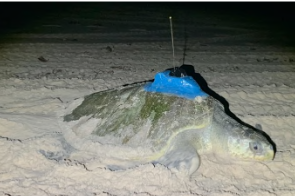Higher Degree by Research Application Portal
| Title | At sea behaviour and habitat use of marine turtles across Northern Australia in relation to in-situ oceanography |
|---|---|
| Supervisor | A/Pro Ivica Janekovic |
| Course | Doctor of Philosophy |
| Keywords | Sea Turtle habitat mapping oceanography CTD Northern Australia |
| CTD tagging | |
| Oceanology | |
| Ocean data analysis | |
| Individual based modelling | |
| Research area | Biological Sciences |
| Environmental Sciences | |
| Earth Sciences | |
| Project description | Project: A pilot study led by the Integrated Marine Observing System Animal Tagging sub-facility, the Sydney Institute of Marine Science (SIMS) in collaboration with Indigenous Ranger groups the Australian Institute of Marine Science (AIMS) and other Government Agencies deployed tags on marine turtles in northern Australia. These tags collect information on turtle movement but also have conductivity-temperature-depth (CTD) instruments that can provide essential oceanography data in the poorly studied seas of Northern Australia. The pilot study was successful and now further tag deployments on turtles are planned. We now seek a PhD candidate to assist with these deployments and analyse the existing data and new data to compare the at-sea behaviour, distribution and habitat use of the three turtle species and understand how in situ oceanography influences this behaviour. The successful candidate will be based at the University of Western Australia (UWA) and be supervised by a team of researchers from UWA, SIMS and AIMS. The successful candidate will join a vibrant team of students and researchers working on a range of topics in marine ecology and oceanography. |
| Opportunity status | Open |
| Open date | 30 Aug 2024 |
| Close date | 01 Nov 2024 |
| Additional documents | |
| School | Graduate Research School |
| Contact | A/Prof. Ivica Janekovic (ivica.janekovic@uwa.edu.au) |
| Specific project requirement | Position: Eligibility: |
| Additional information | Essential criteria:
Desirable criteria:
Application: 1) A personal statement of no more than 500 words why you are interested in pursuing a PhD and this project in particular. 2) A document briefly addressing each of the selection criteria. 3) Your CV (including contact details for two academic referees) |
| Course type | Doctorates |
| Description | The Doctor of Philosophy (PhD) is a program of independent, supervised research that is assessed solely on the basis of a thesis, sometimes including a creative work component, that is examined externally. The work presented for a PhD must be a substantial and original contribution to scholarship, demonstrating mastery of the subject of interest as well as an advance in that field of knowledge. Visit the course webpage for full details of this course including admission requirements, course rules and the relevant CRICOS code/s. |
| Duration | 4 years |
Guidance
Students intending to undertake a dissertation or thesis as part of a Higher Degree by Research (HDR) course at The University of Western Australia, are required to have acquired adequate research preparation, prior to being admitted into a course.
The University's Adequate Research Preparation Policy (UP11/25) details this requirement.
The policy broadly states:
- An applicant is normally considered to have fulfilled the requirements for admission to a HDR course if they can demonstrate that they have undertaken supervised individual research in which they have designed and conducted a scholarly investigation in the context of an existing body of knowledge.
- In exceptional circumstances, consideration may be given to applicants whose qualifications do not meet the definitions of adequate research preparation outlined in the policy (clause 4.1), where the school/supervisor believes that the applicant is likely to succeed in the course. In these circumstances, admission may be granted to a Masters Degree by Research in the first instance.
